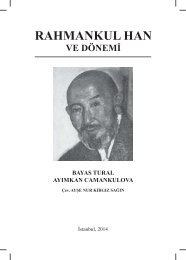THE SOVIET HISTORIOGRAPHY AND THE QUESTION OF KAZAKHSTAN’S HISTORY
SOVYET-TARIH-YAZICILIGI-ENG
SOVYET-TARIH-YAZICILIGI-ENG
You also want an ePaper? Increase the reach of your titles
YUMPU automatically turns print PDFs into web optimized ePapers that Google loves.
<strong>THE</strong> <strong>QUESTION</strong> <strong>OF</strong> <strong>KAZAKHSTAN’S</strong> <strong>HISTORY</strong> 187<br />
Also, according to Russian historians, Russians saved Turkish people<br />
in the region from the enemy, safeguarded them and ensured their<br />
progress in every field. Russian expansionism was considered as a<br />
blessing to the peoples of Golden Horde and the other khanates. In<br />
fact, it is still the same today: “Kazan’s annexation to Russia meant<br />
its inclusion to the consistent structure of the central state. And this,<br />
took Kazan khanate out of the political and economic fragmentation<br />
that caused feudal conflicts and saved Volga geography out of the<br />
Ottoman captivity.” 342 Most of the Russian historians who work on<br />
this topic initiate their works with F. Engels’ thoughts: “Russia indeed<br />
had a receptive role for East. Russian dominion played a role that civilizes<br />
Black Sea and Caspian Sea, Central Asia, Tatars and Bashkirs.” 343<br />
According to the Russians, the khanates and their folk were barbaric<br />
and to civilize this barbarism was the reason behind Russian expansionism.<br />
Unfortunately, Turkish historians who lived in USSR could<br />
not contradict that.<br />
There was another conflict in Soviets’ position. During the time of<br />
Golden Horde and the inheritor khanates, the formation ethnic identity<br />
in Volga-Ural was completed and Russians named the people which<br />
consisted of Volga Bulgarians, Kipchaks and other Turkish tribes in the<br />
region as “Tatars”. The word “Tatar” took place in Dīwān Lughāt al-Turk<br />
as well as in Orkhon inscriptions and it is the name of a Turkic tribe.<br />
However, there was another Tatar clan among Mongolians and this<br />
tribe had Mongol origins. The Tatar clan was very brave and ruthless;<br />
therefore, in Russia and Europe, all Mongols became to be called Tatar.<br />
Russians named the Volga-Ural’s Muslim Turkish people as “Tatar”, in<br />
regard to this Mongolian tribe. 344 In other words, Russians called the<br />
Volga-Ural people “Tatar” while they claimed that these people had<br />
no connection with Golden Horde. Other than that, before the USSR,<br />
Russians had another interesting practice. Tsarist Russia called every<br />
Turkic tribe under the nominal “Tatar”. They did this to claim that<br />
their “Tatars” had nothing to do with Turkey’s Turks. Unquestionably,<br />
this designation was a wrong practice for Russians, because all the<br />
Turkic tribes were put together under single roof, even though they<br />
had different names. This mistake was namely revealed because the<br />
Russians abandoned this practice. At last, they named Turkey’s Turks<br />
342 Moiseeva, G. N. “Kazanskaya İstoriya”, p. 6.<br />
343 Ibid.<br />
344 For detailed information about name “Tatar” and “Tatars” see İlyas Kamalov, “Tatar Adının<br />
Tarihçesi”, Avrasya Fatihi Tatarlar, prep. by. İlyas Kamalov, Kaknüs Press, İstanbul 2007,<br />
pp. 11-34.



